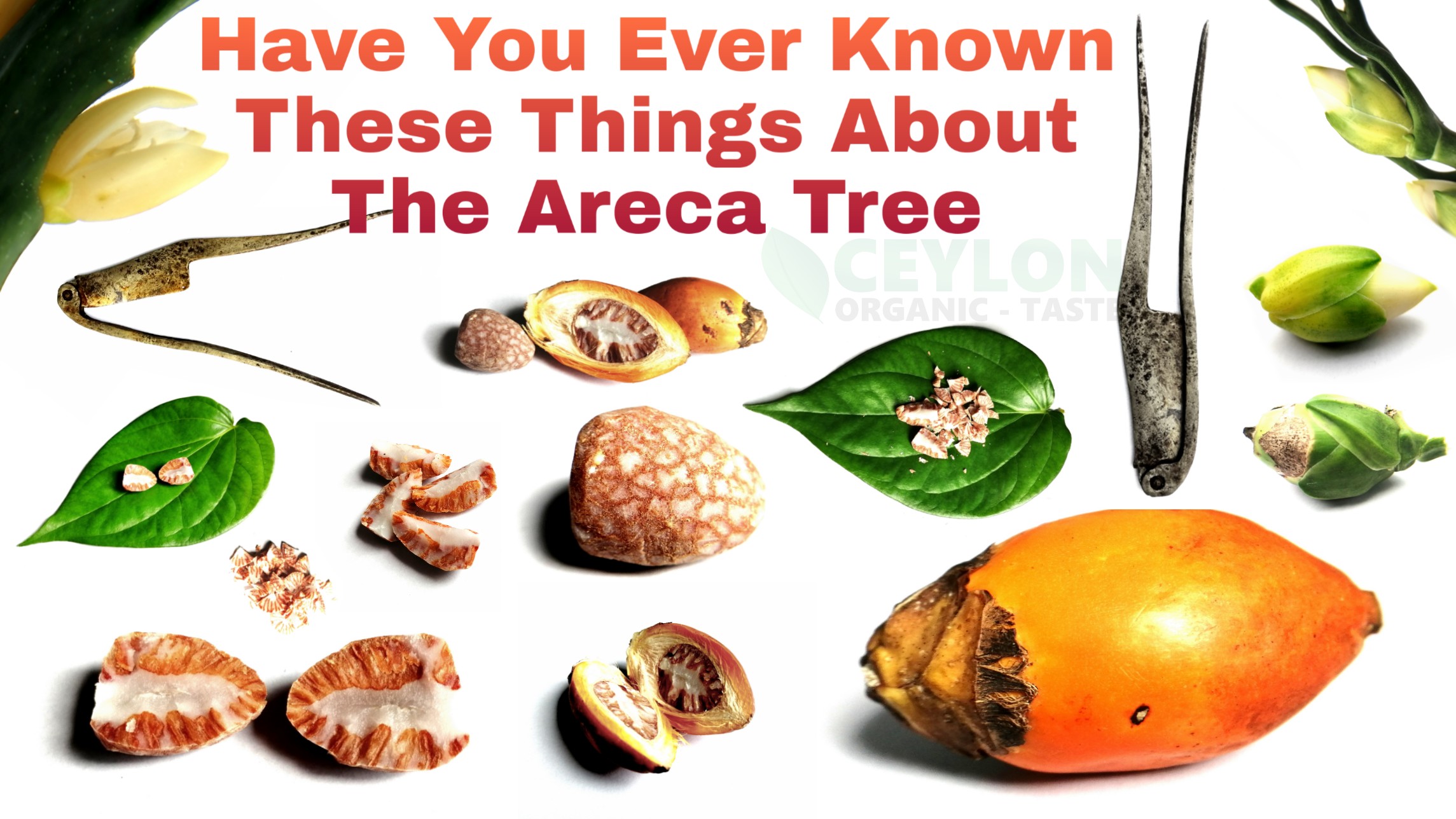Have you ever known these things about the Areca Tree
Since ancient times, paddy farmers, Cart drivers, carpenters, gem miners, masons, blacksmiths, toddy makers (coconut, palm, kitul), hunters, fishermen or whoever, have been accustomed to using “Bulath Wita” as an essential part of people's lives in Sri Lanka. Areca nut is the main ingredient in the taste of 'Bulath Wita', the traditional delicacy of the Asian countryside.

The bulath wita is associated with Sri Lankan culture. In the past, when a stranger, neighbour, or outsider comes to the house, First presented is a bulath witak or medicinal drink.

In a perfect bulath wita recipe has areca nuts, betel leaves, cardamoms, cloves, nutmeg and mace, cumins, gingers and it's medicinal. but, Currently, people add tobacco and limestone powder and that is not good for health. It is said that after the royal meal, the kings of Sri Lanka have used 15 different kinds of natural flavours to make Bulath wita. According to archaeological evidence, chewing Bulath wita in Asian countries dates back nearly 4000 years.

It is a native of Asia. There are two varieties of areca nut that are popular in Sri Lanka “ Sinhala areca nut” and “rata areca nut”. Sinhalese areca nut has a "bitter taste" flavour, and eating too much of the areca nuts can cause some intoxication. Therefore, It is best to use only the right quantities.

Before the Sinhala areca nut is ripened, it is called "Golae puwak" and the well-ripened areca nut is called "rubbada". As a plantation, mixed plantation, fencing and boundary cultivation have been popular in rural and semi-urban areas since ancient times in Sri Lanka. also, Areca palms can be seen in along the canals and large paddy fields.

A well-ripened areca nut can be planted in a place of its own, with a depth of 2-3 inches. The free-growing areca palm grows to about 10-15 feet (usually within 4-5 years) and begins to produce fruit. Usually, an areca palm tree grows up to 30 to 50 feet high. It is noteworthy that in Sri Lanka, No need to use fertilizers for growing an areca tree.

The tool of cutting areca nut is known as “giraya”. The National Museums of Sri Lanka has a variety of “giraya” used during the Sinhala period. It reflects the mutual relationship between areca nut and “giraya” in the past.

Small pieces of areca nuts are also used with betel leaf to worship the Lord Buddha This is known as the “dehath”. Therefore, it can be called a holy plant.

The flower and trunk of the areca nut tree are also used frequently in Sinhala cultural events such as pirith mandapaya ( LORD BUDDHA words chanting arrangement ), magul poruwa ( wedding declarations), thorana ( light festival arrangements mostly in LORD BUDDHA Vesak Festival ), shanthikarma, thowil, yathukarma ( kinds of process to cure some diseases or any ghost effects using by sound wave science and mantra science ) and etc. The trunk has been used also used in the mining industry to make tunnels and in the construction of old houses.

Also, A special part of areca tree leaves is a very popular thing among local peoples. It's a very useful part and known as “kolapatha”. In the past, although artificial packing items were not as present, well-prepared areca leaves part was used to parcel rice and foods. It is environment friendly and healthy. One of the benefits of this, food doesn't go bad quickly. In the past, the farmers have brought food to the paddy fields through a packing made of these leaves. Also, these have been used to make ropes in the past. It has also been used as a plate and It is well known that the food on the plate is delicious.

The seed contains alkaloids such as arecaidine and arecoline. when chewing, feels an intoxication. The seed also contains condensed tannins called arecatannins which are carcinogenic.

The important thing is the medicinal value of the areca. It is used in traditional medicine. Also, it is a well-known fact that it is used for Chinese medicine.

Health Benefits 👇
+ Beneficial for digestive aid
+ Used in traditional oral disease recipes
+ Used for treating eye disorders
+ Areca is used for the treatment of schizophrenia
+ In the case of nervous system disorders, it is used for granting quick stimulations to nervous
+ In the case of biting bees, the juice of a ripe areca nut is used to the coating on the place of biting.

Other Uses 👇
+ for toothpaste
+ for making “kasayam”
+ for veterinary medicines
+ for removing of tapeworms

Because inappropriate use can cause side effects, It is advisable to use it on medical advice
Scientific Classification
Kingdom: Plantae
Clade: Tracheophytes
Clade: Angiosperms
Clade: Monocots
Clade: Commelinids
Order: Arecales
Family: Arecaceae
Genus: Areca
Species: A. catechu
Binomial name: Areca catechu
Clade: Tracheophytes
Clade: Angiosperms
Clade: Monocots
Clade: Commelinids
Order: Arecales
Family: Arecaceae
Genus: Areca
Species: A. catechu
Binomial name: Areca catechu



Comments
Post a Comment